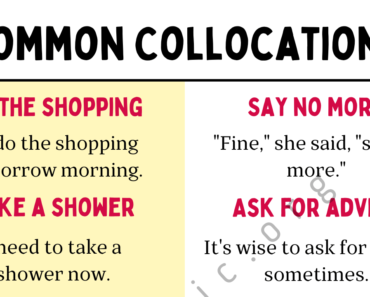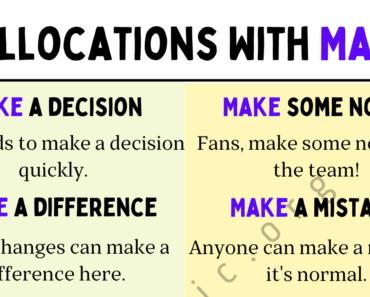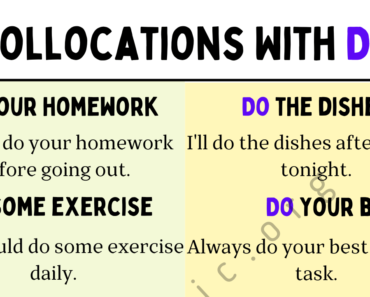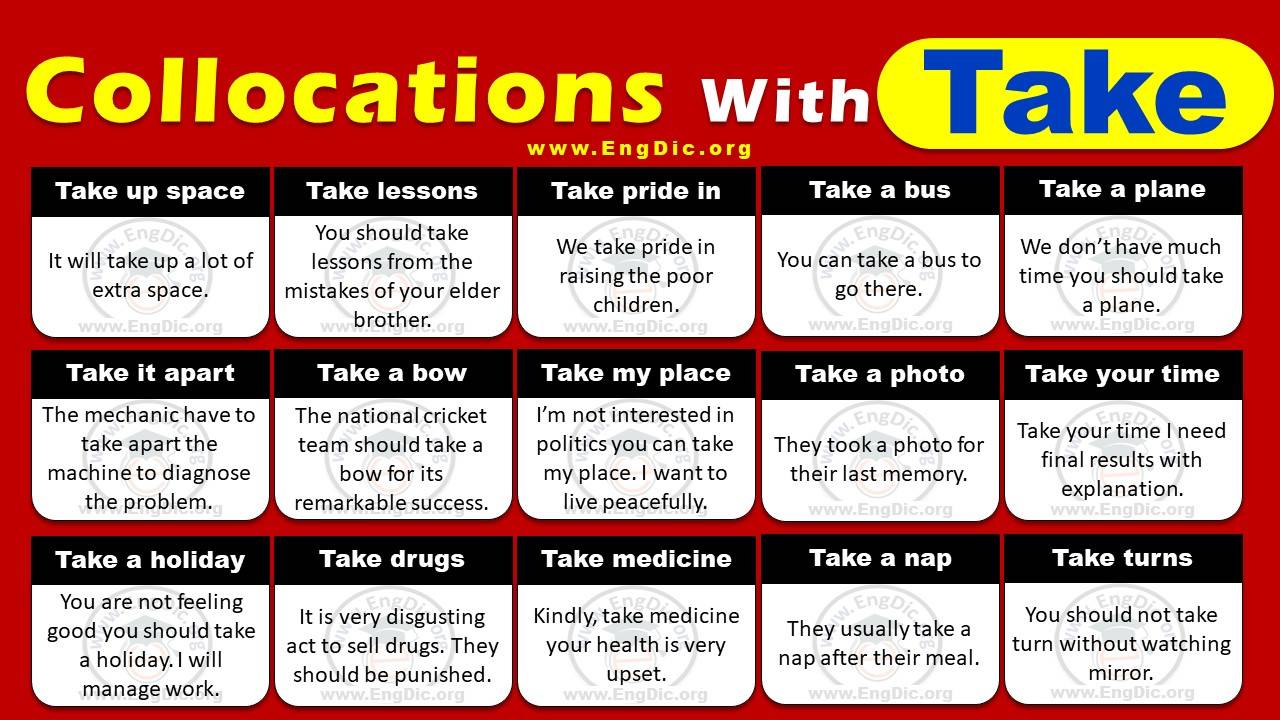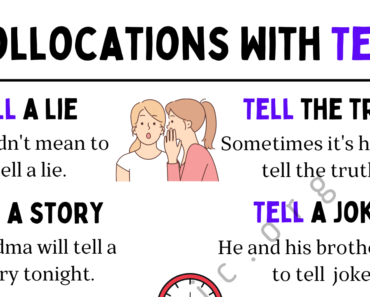20 Common Collocation Words! Collocations are words that typically go together in English. For example, a common collocation is “make a mistake.” We don’t usually say “commit a mistake” or “do a mistake.”
Learning collocations will help your English sound more natural and fluent. In this blog post, we’ll look at the definition of collocations and provide a list of commonly used ones. By the end, you’ll have a better understanding of how to use them in your own speaking and writing. Thanks for reading!
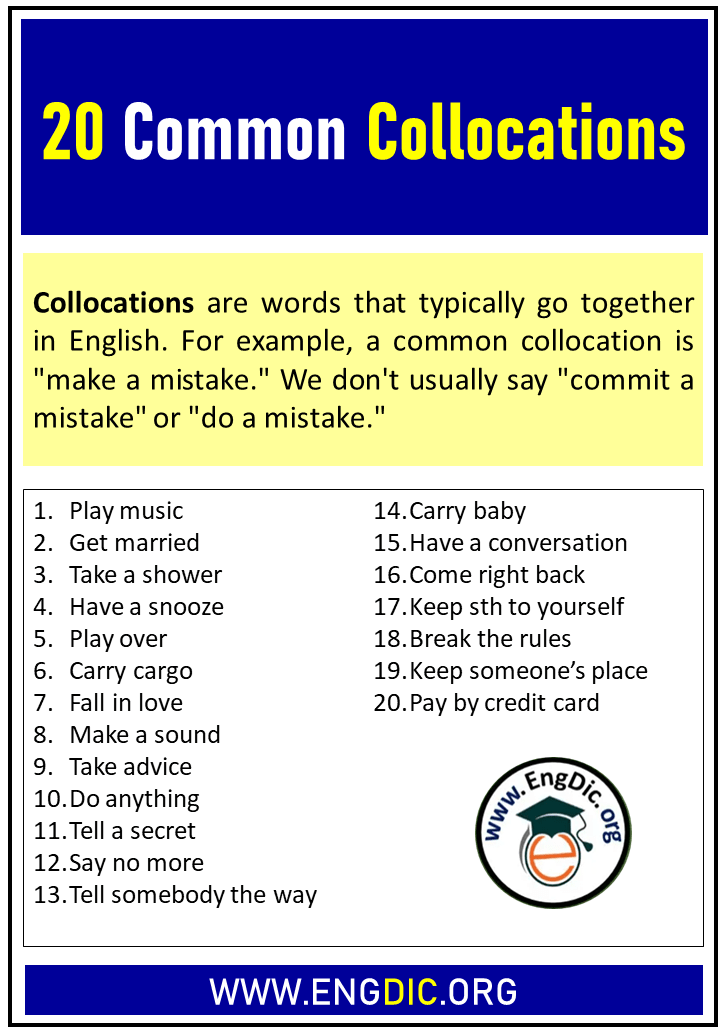
List of 20 Common Collocations
- Play Music
- Get married
- Take a shower
- Have a snooze
- Play over
- Carry cargo
- Fall in love
- Make a sound
- Take advice
- Do anything
- Tell a secret
- Say no more
- Tell somebody the way
- Carry baby
- Have a conversation
- Come right back
- Keep sth to yourself
- Break the rules
- Keep someone’s place
- Pay by credit card
20 Collocations and Their Meaning
1. Play Music
“Play music” is a collocation that refers to the act of performing or listening to music. It can also mean operating a musical instrument. This collocation is commonly used in various contexts such as concerts, parties, or while driving. It can also be used in a figurative sense to mean to do something well or with skill.
- I love to play music while I work.
2. Get Married
“Get married” is a collocation that refers to the act of becoming legally bound in a marriage ceremony. This collocation is commonly used in the context of relationships and love. It usually involves a commitment between two people to live together as partners for the rest of their lives.
- They are planning to get married next year.
3. Take a Shower
“Take a shower” is a collocation that refers to the act of washing oneself with water to clean one’s body. This collocation is commonly used in the context of personal hygiene and cleanliness.
- I always take a shower in the morning to start my day.
4. Have a Snooze
“Have a snooze” is a collocation that refers to the act of taking a short nap or a quick sleep. This collocation is commonly used in the context of relaxation.
- After lunch, I like to have a snooze to recharge.
5. Play Over
“Play over” is a collocation that refers to the act of repeating or reviewing something that has already been said or done. This collocation is commonly used in the context of music, sports, and other performances.
- The song is so catchy, I keep playing it over and over.
6. Carry Cargo
“Carry cargo” is a collocation that refers to the act of transporting goods or merchandise from one place to another. This collocation is commonly used in the context of transportation and logistics.
- The ship is designed to carry cargo across the ocean.
7. Fall in Love
“Fall in love” is a collocation that refers to the act of developing strong romantic feelings for someone. This collocation is commonly used in the context of relationships and love.
- They fell in love while studying abroad.
8. Make a Sound
“Make a sound” is a collocation that refers to the act of producing noise or creating a specific type of sound. This collocation is commonly used in the context of music, movies, and other forms of entertainment.
- If you make a sound, you might scare the birds away.
9. Take Advice
“Take advice” is a collocation that refers to the act of receiving guidance or recommendations from someone with more experience or expertise in a particular area. This collocation is commonly used in the context of mentorship and career development.
- I need to take your advice on this matter.
10. Do Anything
“Do anything” is a collocation that refers to the act of performing any type of action or task. This collocation is commonly used in the context of offering help or expressing a willingness to do anything necessary to achieve a goal.
- I’ll do anything to help my friends.
11. Tell a Secret
“Tell a secret” is a collocation that refers to the act of revealing private or confidential information to someone else. This collocation is commonly used in the context of sharing personal stories or gossip.
- Please don’t tell anyone my secret.
12. Say No More
“Say no more” is a collocation that refers to the act of acknowledging someone’s message without the need for further explanation. This collocation is commonly used in the context of understanding and agreement.
- Say no more, I understand what you mean.
13. Tell Somebody the Way
“Tell somebody the way” is a collocation that refers to the act of providing directions or guidance to someone who is trying to find a specific location. This collocation is commonly used in the context of traveling and navigation.
- Can you tell me the way to the train station?
14. Carry Baby
“Carry baby” is a collocation that refers to the act of holding a young child or infant in one’s arms or a baby carrier. This collocation is commonly used in the context of parenting and childcare.
- She was carrying her baby in a sling.
15. Have a Conversation
“Have a conversation” is a collocation that refers to the act of engaging in a verbal exchange with another person or a group of people. This collocation is commonly used in the context of socializing and building relationships.
- I love to have conversations with interesting people.
16. Come Right Back
“Come right back” is a collocation that refers to the act of returning to a place or situation quickly or immediately. This collocation is commonly used in the context of making promises, such as “I’ll come right back,” or in the context of giving instructions, such as “Come right back after you finish your errands.”
- I’ll be back soon, just need to come right back.
17. Keep Something to Yourself
“Keep something to yourself” is a collocation that refers to the act of not sharing information or keeping something private. This collocation is commonly used in the context of secrets, personal information, or confidential matters.
- I’ll keep this to myself, I promise.
18. Break the Rules
“Break the rules” is a collocation that refers to the act of violating established regulations or guidelines. This collocation is commonly used in the context of sports, games, or legal matters.
- He broke the rules and got in trouble.
19. Keep Someone’s Place
“Keep someone’s place” is a collocation that refers to the act of holding a spot or a position for someone else, often temporarily. This collocation is commonly used in the context of saving seats or places in line for others.
- Can you keep my place in line while I go to the restroom?
20. Pay by Credit Card
“Pay by credit card” is a collocation that refers to the act of making a payment using a credit card as a method of transaction. This collocation is commonly used in the context of online shopping, restaurants, or other businesses that accept credit cards as a form of payment.
- I’ll pay by credit card, please.

